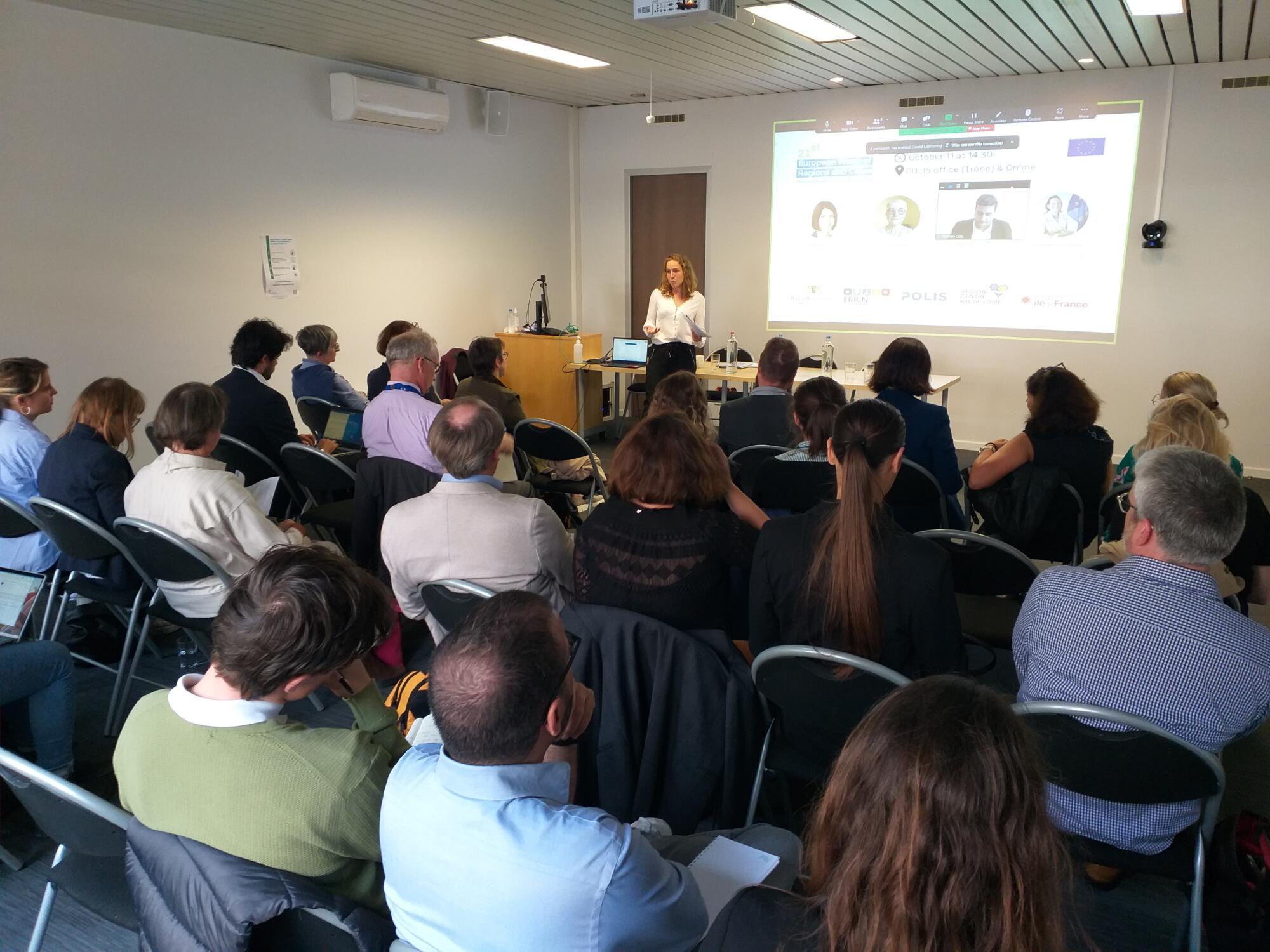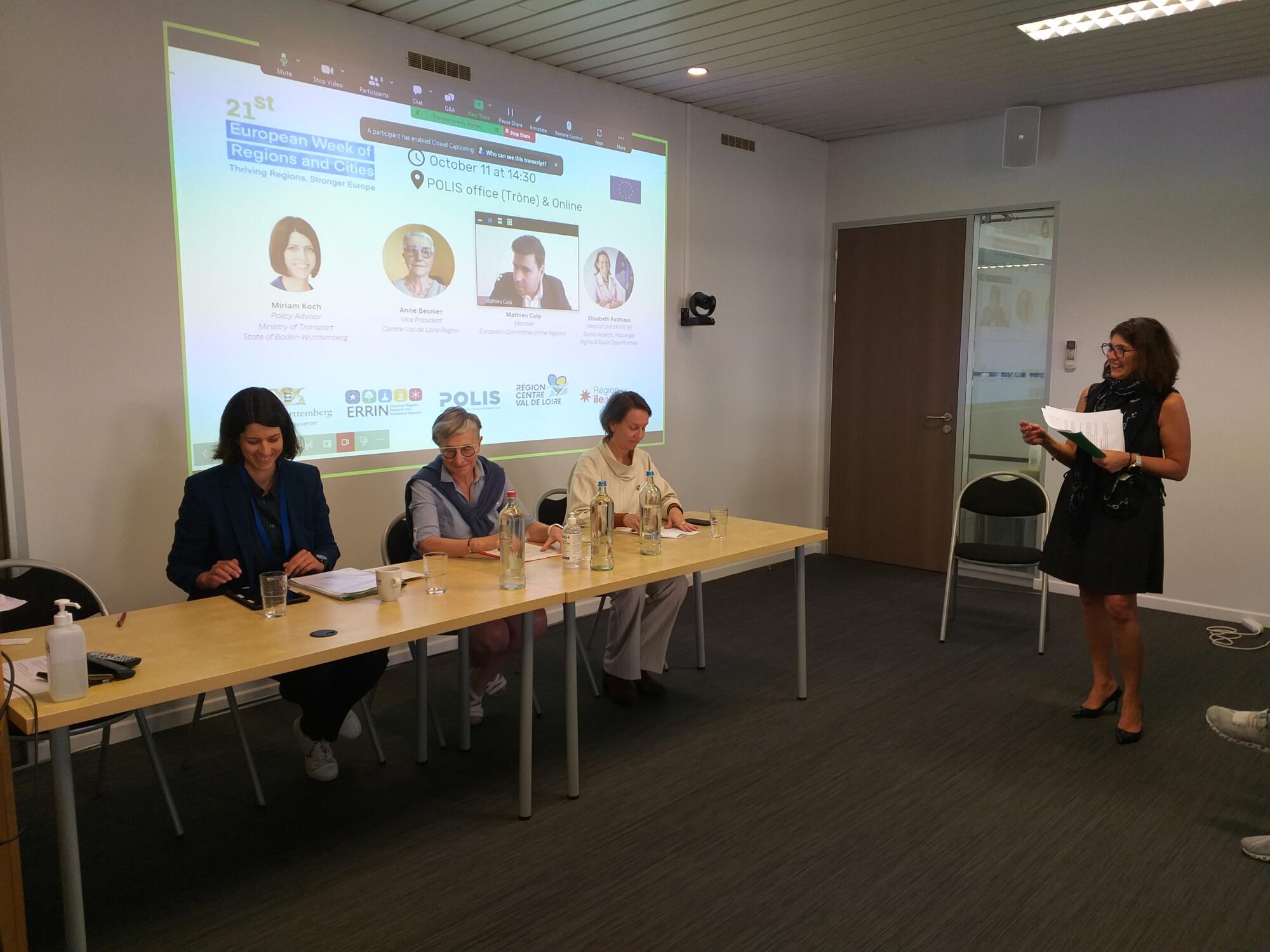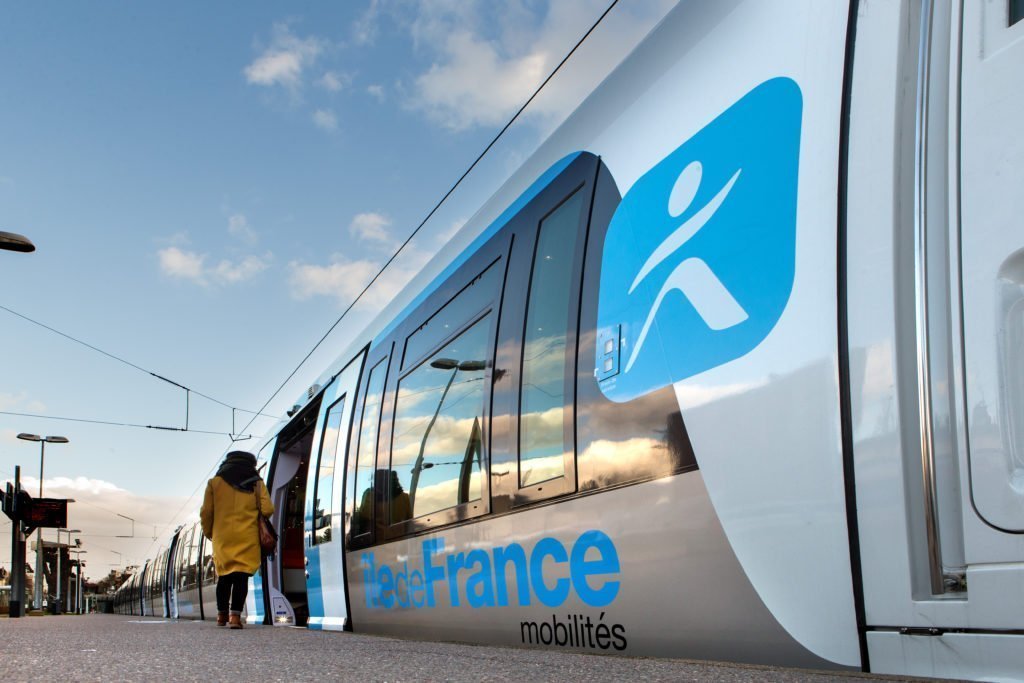EU Regions Week showed active regional involvement to support transport workers
In the framework of the EU Week of Regions and Cities in combination with the European Year of Skills, POLIS, ERRIN and Ile-de-France Europe convened a fine panel to shed light on regional action to support transport workers in the upcoming digital transition.
The meeting took place in the POLIS office on 11 October and gathered about 30 participants who listened to 4 great speakers with experience in the transport sector and knowledge to share on workers' future.

The workshop brought together Elisabeth Kotthaus, head of unit in charge of social aspects, passenger rights and equal opportunities, DG MOVE at the European Commission, Mathieu Cuip, regional councillor of Ile-de-France and member of the Committee of the Regions, Anne Besnier, vice-president of the Centre-Val de Loire region, and Miriam Koch, consultant at the Baden-Württemberg Ministry of Transport, to discuss the challenges faced by the transport sector, and how local and regional authorities are coping with the sector's transformation.
Manon Coyne, Project Manager at POLIS network, introduced the subject by presenting the lessons learned from the WE-TRANSFORM project, funded by the European Union and featuring POLIS as one of the main partners. This project brings together players representing all modes of transport and the ecosystem (industry, social partners, operators, users, logistics, education, authorities, etc.) to draw up a comprehensive inventory and policy recommendations supporting workers in the sector by anticipating the arrival of innovations. The European Commission plans to publish a recommendation on how to deal with the impact of automation and digitalisation on the transport workforce by the end of 2023, while the Committee of the Regions is working on an opinion on the need for a just transition in Europe's automotive regions, extensively covering skills and employment. Several European initiatives and research projects concerning changes in the transport sector were also presented, including the "Don't Gig Up" project (on self-employed workers), the "STAFFER" project (on the rail sector) and the "SKILLSEA" project (on the maritime sector).
The speakers then presented the challenges and needs at their level.
For Miriam Koch, it is important to understand the skills required by companies in the sector, in order to anticipate needs for the recruitment and training of the future workforce. Miriam Koch presented the results of a study carried out by the Baden-Württemberg Ministry of Transport, which focuses on the job requirements of administrative workers, engineers and drivers, with a view to adapting to future developments and needs in terms of workforce.
Anne Besnier emphasised the importance of the transport sector for the Centre-Val de Loire region, which is a major centre for aeronautical subcontracting, and benefits from the presence of world leaders (Thales, MBDA, etc.), as well as a large network of SMEs and SMIs. However, at a time when the aeronautical sector is facing a number of challenges to ensure its green transition, it is essential to strengthen skills in the fields of aerodynamics, propulsion and composite materials, in order to reduce aircraft fuel consumption and CO2 emissions. The Centre Val de Loire region is therefore seeking to develop training in these areas.
Mathieu Cuip first underlined that the future of the transport sector is a key issue, as mobility is crucial to European construction and unity. The sector has begun its transition, taking greater account of ecological issues, but it is also facing a number of challenges, not least a shortage of staff, which was particularly acute after the COVID-19 pandemic, in airports for example. There are 5,000 vacancies in the Paris region airports alone. So the challenge is to make the sector attractive, especially to young people.
Elisabeth Kotthaus presented the European Commission's initiatives, recalling its limited powers and means of action. In particular, the Commission is supporting Member States by putting in place indicators to compare and encourage the development of transport, and will shortly be presenting a recommendation to address the consequences of automation for the sector's workforce, focusing on knowledge sharing, skills development and training. The Commission also wants to make the sector more attractive to women, who hold only 20% of job positions in the sector.

After that, the speakers presented initiatives developed at their level to meet the challenges related to transforming the sector.
Mathieu Cuip outlined the strategy being implemented in the Paris region to make the sector more attractive and recruit more young people. On the one hand, the "Aerowork" platform allows people to apply for jobs in Paris airports without a CV, by simply answering a series of questions to find out which position might be suitable for the applicant. The "Oriane" platform on another side is aimed at jobseekers and brings together all the available training courses funded by the Ile de France region. A grant of 2,000 euros is awarded to people enrolling for training in the transport sector.
Anne Besnier presented the "Cité aéronautique Centre Val de Loire" initiative, which aims to encourage young people to enrol in training courses and helps to boost the attractiveness of the region and the sector. She pointed out that the Cité aéronautique is much more than just an aeronautical maintenance centre: it's a third-party skills centre, a partnership tool serving the region's attractiveness. The Cité brings together key players in the aeronautical industry, research, training, higher education and local authorities. By encouraging exchanges, collaboration and the sharing of knowledge, the Region is creating an environment conducive to the acquisition of skills, innovation and the creation of new opportunities.
Elizabeth Kotthaus emphasised the financial support provided by the European Union to Member States on these issues, with mechanisms such as the Social Climate Fund and the European Recovery Plan. She recalled that EU employment and social affairs ministers had met in Luxembourg on 10 October to discuss the 2023 European Semester and the effects of new technologies on work, and that they had reached a political agreement on a recommendation concerning the development of a framework supporting the emergence of a social economy. The Member States stressed in particular the need to strike a balance between opportunities and risks, for example in relation to the growing digital divide and the need for skills and lifelong learning, as well as to the protection of social and labour rights. They discussed possibilities and threats associated with artificial intelligence and digitalisation. In addition, they reflected on how the European Semester could help Member States take the appropriate measures for a fair digital transition, emphasising the role of social partners and social dialogue. In conclusion, she called on all stakeholders to look to the Member States to implement these recommendations.
The session rightly highlighted the great need for the involvement of diverse stakeholders and informed coordination including all active players to comprehensively support the workers in future transport systems. A great moderation by Françoise Guaspare from Ile-de-France Europe enabled a productive discussion, very interactive, with many questions from the audience and long follow-up exchanges after the session and hopefully even beyond! See you at EU regions week 2024!




